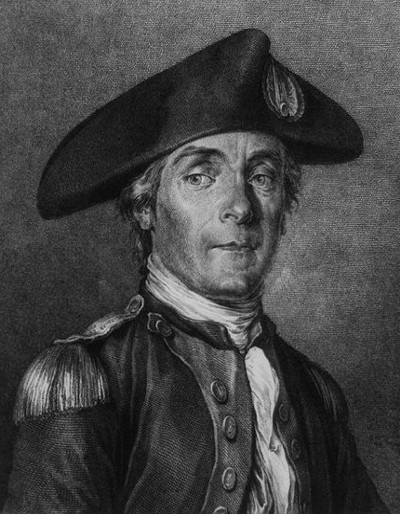
John Paul Jones, American Revolutionary War hero (1747-1792). | Portrait drawn from life and engraved by Moreau le Jeune in 1780,| completed by Jean-Baptiste Fossoyeux in 1781.
John Paul Jones is remembered as one of the greatest and bravest officers in the Continental Navy. He was born John Paul (he added Jones later) in Scotland in 1737 to farmer parents. He entered into an apprenticeship to a merchant ship captain at 13 years old.
During his apprenticeship, he sailed to England, America, the West Indies, and Africa. He went on at least three slaving voyages to Africa and developed a strong dislike of traffic in human cargo, eventually sacrificing his position as first mate on a trip to Jamaica to drop off slaves. He found his own way back to Scotland and took a different position.
He took command of his first ship when he was 21 years old. The Captain and first mate contracted yellow fever and died, and John Paul safely returned his ship and crew to port in Scotland.
There the owners of the ship gratefully made him master of the ship and gave him 10 percent of the cargo.
In an unfortunate incident, he flogged a crew member so hard the man eventually died. Jones’ reputation was destroyed and he spent some time in prison before being released on bail. He took command of a different vessel, and during a mutiny over wages, killed a crewmember. Certain he would not get fair trial, he added “Jones” to his last name and went to take care of the affairs of his late brother in Fredericksburg, Virginia.
He arrived during the rapidly growing discontent over British taxation, when the colonies were on the brink of the Revolutionary War.
Having first-hand knowledge of how underhandedly Scotland was treated by Great Britain, Jones’ sympathies were with the Americans. He left for Philadelphia soon after his arrival to volunteer for the Continental Navy. It was recently established, and suitable officers and captains were in great demand.
Jones was appointed a 1st Lieutenant of the 24-gun frigate Alfred in 1775.
Thanks to support from a North Carolina Congressman, John Paul Jones was given command of a slightly smaller ship, Providence, with which he promptly defeated 16 ships in one voyage.
He took on a larger mission which involved trying to establish rights as prisoners of war for captured American sailors. As the King didn’t recognize America as a nation, captives were treated as treasonous criminals and were forced to work in British mines. While Jones didn’t change the laws, the fact that he could attack so close to home shook the confidence of the Brits.
He changed command several times and occasionally had trouble with crew members, some of whom would rather be privateering than fighting for the Navy. In spite of this, John Paul Jones’ reputation grew.
In between voyages, he also developed a close friendship with Benjamin Franklin, whom he greatly admired.
He is most well-known for his defeat of the British ship Serapis in his Bonhomme Richard (Named in French after Franklin’s “Poor Richard”). He managed to get the ships tied together and they unloaded their cannons into each other.The captain of Serapis asked Jones if he would surrender to which Jones gave his famous reply, “I have not even begun to fight!”
Bonhomme Richard was destroyed, but Jones’ crew won the fight, even though another ship joined the fight against them. He took both ships triumphantly home as a prize.
After the War, the Navy was disbanded, and Jones joined the Russian Navy for a distinguished career during their war with the Turks. He finally traveled to France and eventually died there.


